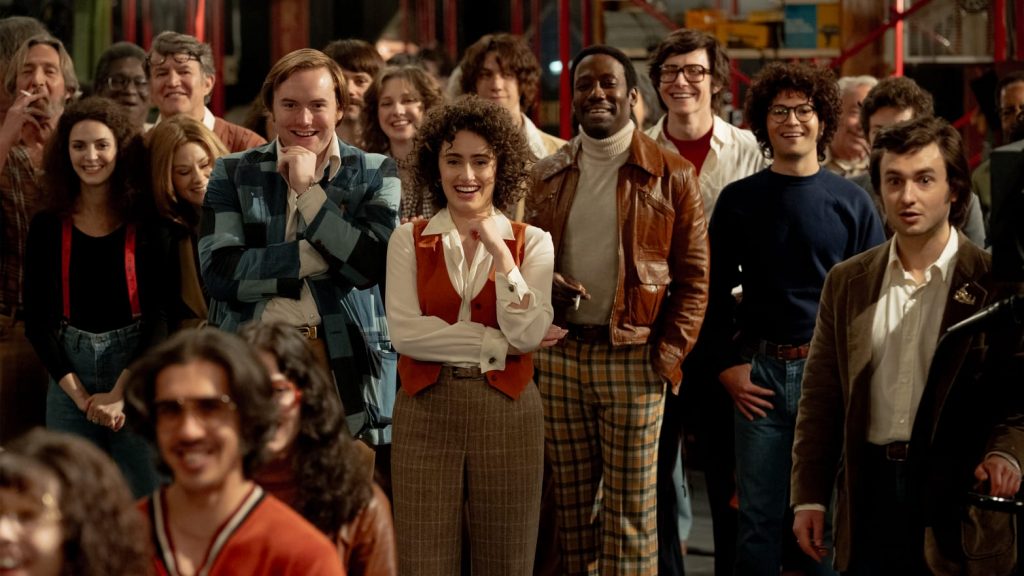Movie reviews include A Private Life, Honey Bunch, and H Is for Hawk.
TFCA Friday: Week of Oct. 4
October 4, 2024

Welcome to TFCA Friday, a weekly round-up of film reviews and articles by TFCA members.
In Release this Week
Alien on Stage (dir. Danielle Kummer, Lucy Harvey)
“At its best, the doc shows the camaraderie of the Dorset players, always laughing and never uttering a bad word to one another as well as parts of the humorous performance at the West end,” says Gilbert Seah at Afro Toronto.
Blink (dir. Edmund Stenson, Daniel Roher)
“It’s impossible to overstate the range of emotions, from heartbreak to delight to humility, conjured by the new documentary Blink, which is also visually dazzling thanks to its pedigree as a National Geographic Documentary,” says Kim Hughes at Original Cin. “Scenes of joy and silliness, not to mention phenomenal family camaraderie and the odd but expected tantrum, are punctuated by the reality darkening the corners of their journey. In one especially wrenching scene during Léo’s 10th birthday celebration, baby-of-the-family Laurent finally grasps what blindness will mean for him and his siblings. He vows to grow up and build a machine to fix it.”
“It’s an unexpectedly moving story about cherishing the life before one’s eyes,” writes Pat Mullen at POV Magazine, who speaks with director Edmund Stenson about bringing the story to screen. “People see and experience the world in a variety of ways,” explains Stenson. “We didn’t feel it was the right approach to become overly technical or overly specific because we risked doing a massive injustice to the visually impaired community and to the value of their stories and the way that they would tell their stories.”
Frankie Freako (dir. Steve Kostanski 🇨🇦)
“A cinematic smoothie made possible by tossing Gremlins, Little Monsters, The Gate, Critters, Ghoulies Go to College, Garbage Pail Kids, and a heaping scoop of Puppet Master into a blender – and then forgetting to put the lid on, so that the kitchen is painted by the confection’s sloppy chunks – Frankie Freako is designed to melt your brain,” says Barry Hertz at The Globe and Mail. “The only question is whether you might welcome such cerebral liquefaction or not.”
On In the Seats with…, Dave Voigt chats with director Steve Kostanski.
Happy Clothes: A Film about Patricia Field (dir. Michael Selditch; Oct. 8)
“Happy Clothes: A Film about Patricia Field follows the multi-award-winning costume designer who got an Oscar nomination for The Devil Wears Prada and looks inside her unfettered imagination,” writes Anne Brodie at What She Said. “From providing the looks for Sex and the City, Emily in Paris, Ugly Betty, Murphy Brown and at least 35 more projects, Field has left her imprint. And who could forget her fiery image, still a redhead in her eighties with full makeup and unforgettable clothes, she’s ruled the roost in TV film and streaming for decades.”
Hold Your Breath (dir. Karrie Crouse and Will Jones)
“The film is a psychological horror set in a western complete with a solitary ranch and a stranger (is he good or evil?) who suddenly invades the ranch,” writes Gilbert Seah at Afro Toronto. “The directors create an excellent atmosphere of dread complete with stunning cinematography of the sandstorms that arise ever so often. The only problem is the too-frequent use of jump scares that otherwise would have made the perfect psychological horror.”
“The sound and the overwhelming dust colours every shot of the film, and while we know the storms are ‘created,’ they feel real and show us the damage they caused to real people back then physically and psychologically,” notes Anne Brodie at What She Said. “The tension of the constant storms wears deeply on us, as it would have a hundredfold for those who lived it. Margaret, a pillar of the community, comes to her wit’s end and only by sheer force of her will and love for the children can she hope to move forward. An immersive film that takes us with it, it offers a twist on the thriller genre, a period piece to help us understand the past and a portrait of a family in crisis.”
Joker: Folie à Deux (dir. Todd Phillips)
“So what is it? A long, lugubrious drama I guess. After an opening animated prologue that recalls one of the darker Looney Tunes shorts of the 1950s, we find Arthur thoroughly de-Jokered and languishing in Arkham State Hospital, where the wardens hope he’ll be proven sane enough to stand trial,” notes Chris Knight at the National Post. “It takes good ideas and refuses to run with them, forever shying away from the big moment or the leap of faith. This is a film that could easily have been many things, but ultimately winds up as none of them.”
“With all due respect to The Substance, Joker: Folie à Deux is the year’s most audacious film — just not for the reasons you might expect. The fact that Folie à Deux is a musical isn’t even the film’s biggest swerve,” says Victor Stiff at Victor Stiff Reviews. “Folie à Deux is a total vibe movie — 15 minutes of plot stretched over a two-and-a-half hour movie. Best case scenario, you sit back and soak in the atmosphere, the over-the-top performances, and wild musical numbers. But don’t expect a straightforward continuation of the Clown Prince of Crime’s origin story. This film is all about mood, atmosphere, and delving into the zealotry of idolizing such barbaric characters. It’s not a plot-heavy film and as a result the story feels like a lot of tire spinning without covering much ground.”
“The film is a disappointment rather than outright disaster. Phoenix remains a highly watchable actor, reminding us of his nightmarish Joker performance that won him best actor at the Oscars. Gaga holds her own in the co-starring role, although she’s not given enough screen time,” says Peter Howell at the Toronto Star. “Another potentially rich narrative path is blocked by the incessant and increasingly annoying musical numbers. Phillips has said repeatedly he had no plans or desire to make a Joker sequel prior to the film’s smashing global success. His track record with sequels isn’t great, as his two anemic followups to the comedy hit The Hangover attest.”
“I would actually listen to the soundtrack to this movie,” confesses Jim Slotek at Original Cin. “Gaga fans will be disappointed to hear her pull back her voice to match that of a chain-smoking mental patient (though her range still comes through). And Phoenix’s already gravelly/close-enough voice actually works with the right song. When he implores Lee with a rendition of ‘If You Go Away,’ he sounds like he’s channeling his erstwhile screen role of Johnny Cash. To repeat, Folie à Deux is not ‘canon.’ It’s a writer/director realizing a vision with something sincere and clever, which you can accept or reject. Superhero fans will get their fix soon enough. But this is not that.”
“This is an unnecessary sequel about unnecessary sequels and a litigation of its previous success, diving deeply into the very notion of wanting to know more about that which when finally understood is seen to be more pathetic and pedantic than profound,” says Jason Gorber at Paste. “Phoenix is fine, Gaga is great, but the entire exercise feels anything but enjoyable. Yet it’s also bold in its breadth, taking seriously the intoxicating draw of nihilism and stripping it bare.”
“This movie is in every respect a meta-commentary on what Joker was supposed to mean — simultaneously a more direct and more confusing artistic statement from Phillips that is as disjointed as something pulled from the journal of a narcissistic psychopath,” says Jackson Weaver at CBC. “It’s a correcting of the record that exists more for its creator than its audience, an unnecessary skin-tag hanging off the original. And, most importantly, it’s boring.”
“The success of the first Joker encourages Phillips to cosplay as renegade auteur. However, the metteur-en-scène ensures that Folie à Deux also lacks the depth or, frankly, interest to say anything meaningful despite its cavalcade of ‘We LivE in A sOciEtY’ musings,” writes Pat Mullen at That Shelf. “When the film’s inevitable bloodbath leads Joker out into the streets with his admirers, one can’t help but feel sorry for everyone who donned make-up and a funny suit to fill the room and sit through this mess. Joker’s poisonous rallying cry for the incel rebellion ends with a sad, impotent whimper.”
Matt and Mara (dir. Kazik Rdwanski 🇨🇦)
“One of the most fearless actresses of her generation, the rising Canadian star possesses a determined and fiercely curious desire to claw under the skin of a character, evaporating the line between fabrication and fact to a wisp of thin air. Watching Campbell walk such a kind of cinematic high-wire act in the 2019 character study Anne at 13,000 ft or the forthcoming psychological drama Measures for a Funeral is to witness performances that are wonderfully audacious dares. There is an intensity and commitment in Campbell’s work that mesmerizes, even frightens, with its sheer boldness,” proclaims Barry Hertz at The Globe and Mail. “Yet in her new movie, the romantic dramedy Matt and Mara, which reunites the actress with her Anne at 13,000 ft director Kazik Radwanski, Campbell might pull off the most courageous act of her career so far: drinking water straight from the sidewalk splash-pad fountain at Toronto’s grody Yonge-Dundas Square. Get this woman on Fear Factor.”
“As is his style, Radwanski doesn’t tell the story in conventional scenes that move us from one to the next, building to a crescendo and resolution. Instead he dips into a scene and then out again, so that we see the characters in unguarded moments, each time revealing more of the way they affect each other,” says Karen Gordon at Original Cin. “Campbell and Johnson – both of whom worked with Radwanski in Anne at 13,000 ft. – make a great team. They’ve been allowed to improvise some of their dialogue, which adds to a sense that we’re eavesdropping on two people who are responding to a particular moment.”
“An admirer of the relaxed naturalism and subtle ethical inquiries of the films of Eric Rohmer (whom he hat-tips twice in Matt and Mara), Radwanski is fascinated by the small and often unconscious choices people make in life that can have unforeseen consequences. He’s drawn to characters who are hard to love but impossible to hate. In Campbell and Johnson he’s found two eager conspirators and brilliant actors,” writes Peter Howell at the Toronto Star. “Radwanski is a filmmaker of great economy, not just in the brisk running time of his features but in his dialogue, speaking volumes about his characters and their back stories with a few well-chosen words.”
“Radwanski is excellent at allowing scenes to breathe and grow beyond that of a normal dramatic setup. Campbell and Johnson were encouraged to improvise their roles and the chemistry between the two is obvious,” says Marc Glassman at Classical FM. “They are clearly quite different as performers: Campbell is an interior deliberate actor whose gestures are quietly meaningful while Johnson loves to over-play his roles as a big, confident guy. There is something going on between them but it’s unclear what it is: friendship or love?”
The Outrun (dir. Nora Fingscheidt)
“Saoirse Ronan is nothing short of masterful,” declares Anne Brodie at What She Said. “It’s magical sometimes, spiritual, and urgent, but the film is also choppy, muddled and overworked at points. Transformation and pure power create a stunning end chapter, a brilliant piece of art, psychology, timelessness, natural history and renewal.”
At The Globe and Mail, Johanna Schneller speaks with Saoirse Ronan about tackling the portrait of addiction: “The memoir presents this universal addiction story in a way that is so specific,” Ronan says. “What Jack [Lowdon] and I spoke about the most was how unusual it is to follow a young woman from a middle-class background as she’s in recovery. Amy had a great job, great friends. On paper there was no reason why this should happen. Which allows us to reframe the idea that we all have of an addict.”
“Addiction can be difficult to portray on screen, as the whims and self-sabotage can feel foreign, with some audience members only relating on a superficial level, and others feeling a deeper connection,” says Rachel Ho at Exclaim!. “Ronan as Rona continues to build her filmography choosing strong roles that challenge and expand her abilities as an actress, a challenge she readily takes up. Within Ronan exists a deep sorrow and hollowness that fights against her naturally sunny disposition, and she seems driven by a curious nature and desire to see the world become a better place. It’s an interesting push and pull that forms a character who we feel compassion for, rather than hair-pulling frustration.”
“Films about people recovering from abuse don’t make for easy viewing. You know that there will be suffering and over-indulgence and self-recrimination because that’s what happens when you abuse a substance or are in an abusive situation,” notes Marc Glassman at Classical FM. “As an audience member, you’re there to feel the emotions—the pain and humiliation—in order to arrive at a revelation, which will hopefully justify the tough ride you’ve been on with the main character. Some of these films work but too many feel toxic themselves. The stakes are high for creators of such films: they better be good enough to make the emotional journey worthwhile.”
The Platform 2 (dir. Galder Gaztelu-Urrutia)
“Watching Platform and The Platform 2 back to back, actually may make for a much more effective emotional experience as this universe brings up serious dystopian and heady themes that need to be firmly planted in your head,” says Dave Voigt at In the Seats. “Ultimately, The Platform 2 still works as a cold glimpse of how easy it is to make a society breakdown but it forgot to allow us to get emotionally invested in this grim dystopian journey which just means we’re probably more inclined as a species to repeat our mistakes rather than learn from them.”
“For those who remember the first movie, number 2 provides more of the same,” notes Gilbert Seah at Afro Toronto. “Still amazing in terms of concept and delivery despite its incredible premise.”
[Trailer not available]
Rez Comedy (dir. Quentin Lee, Keith Nahanee 🇨🇦)
“As far as the film goes, credit is given for Indigenous content and comedy content as well,” notes Gilbert Seah at Afro Toronto. “The film plays like an anthology with 8 segments of standup comedy routines. The funniest of the stands is Keith Nahanee, the first one featured and thankfully also, the host of the Comedy Special Show.”
Saturday Night (dir. Jason Reitman)
“It’s an exhilarating ride and, even though we know the ending, there’s clockwork suspense as everything conspires against it – from the ticking time bomb of Belushi’s manic temperament to a Church Lady-like network censor and NBC bosses plotting to bury the show,” writes Brian D. Johnson at Zoomer. Johnson also speaks with Toronto’s own Reitman about revisiting the fateful night of October 11: “It’s the last script of mine that my dad read,” Reitman tells Johnson. “He was skeptical at first when I told him I want to make a movie about the opening night of Saturday Night Live. Probably because he grew up around it and was a part of that scene so much. Then he read the script and just said, ‘You have to make this.’”
“Reitman shrugs off history in favour of the controlled anarchy that SNL represents, which, on the big screen, looks like something hatched by the ghosts of Robert Altman and Federico Fellini. Cinematographer Eric Steelberg whirls his camera through the thicket of people and props with abandon, shooting entirely on 16mm film to impart 1970s grit,” says Peter Howell at the Toronto Star. “Composer Jon Batiste, the Grammy-winning musician who also appears here as musical guest Billy Preston, delivers a percussive score that emphasizes the countdown energy. The film really succeeds with its actors — kudos to casting director John Papsidera — who convincingly embody the real people they play, albeit some better than others.”
“If this were another director telling a true story – say Adam McKay doing The Big Short – the camera would freeze as certain characters are introduced, to offer up a thumbnail description. Reitman prefers a fly-on-the-wall approach. Saturday Night is not going to stop for anything, whether you know what is happening or not,” writes Jim Slotek at Original Cin. “I have no idea whether the things that happen in Saturday Night will be relevant to anyone who wasn’t alive in 1975, let alone watching SNL as I was. Reitman himself wasn’t born yet. But he’s betting the box office that generations of later SNL fans will also find it fascinating.” Slotek also speaks with Reitman about living the dream and working in the world of SNL: “It felt too special, bigger than the Super Bowl, bigger than the Oscars, the fact that every Saturday they do 90 minutes of new comedy. I couldn’t wrap my head around that. It became an early dream of mine to be a writer for Saturday Night Live,” says Reitman.
“[O]ne of the most successful aspects of Saturday Night is the inspired casting that uses a great mix of modern emerging talents to portray the fresh faces who would soon become famous. Cory Michael Smith’s version of Chevy Chase vibrates with ambition and arrogance. Nicholas Podany’s Billy Crystal is sexy, smart and sad. Ella Hunt as the singular Gilda Radner has just a few moments, but channels a playful spark. Dylan O’Brien’s Dan Aykroyd is goofy and endearingly awkward. Tommy Dewey as head writer Michael O’Donoghue is a sharp-tongued assassin,” writes Eli Glasner at CBC. “And Shiva Baby‘s Rachel Sennott appears as Rosie Shuster, Michaels’ wife and co-writer. While the state of their relationship appears nebulous, Sennott brings a game screwball energy to the part.”
“The thesis of Reitman’s film, if it does indeed have one beyond ‘remember this hilarious sketch?’, is that in bringing SNL to life through literal blood, sweat and tears, Michaels closed out one bland chapter in the comedy world to birth another more dangerous one,” observes Barry Hertz at The Globe and Mail. “But even the most hardcore of SNL apologists will find little material here to chew on beyond some truly remarkable performances that blur the line between impression and magic act.”
At Exclaim!, Rachel Ho speaks with Reitman about the balancing act of passing comedy between generations. “‘Comedy is tough because it does not age well. Comedy is usually a reflection of the now,’ says Reitman, pointing to SNL’s success in the political space. ‘[They’ve] always been reacting. By Episode 4, you have Gilda Radner and Candice Bergen talking about the Equal Rights Amendment. And then you can take that all the way through to Chevy [Chase] doing President Ford to Tina Fey, and what Maya Rudolph will be doing this season,’ he says with a grin.”
“It’s a laugh-a-minute backstage dramedy about taking a risk in the increasingly risk-averse world of showbiz. The Altman-esque comedy has a sprawling ensemble and a medley of overlapping dialogue as Lorne Michaels (The Fabelmans’ Gabriel LaBelle) deals with a Murphy’s Law catalogue of crises before showtime,” writes Pat Mullen at That Shelf, who gets some words with Reitman on making the moment before SNL changed television: “There was primary dialogue, which was telling you one story…Then there was the next set of characters who would walk by, who would tell you another story. Then there’s the physicality of the people who were doing something in the background. And then there was deep background action. In every scene, we were trying to tell nine different pieces of story at the same time.”
Trouble (dir. Jon Holmberg)
“The film is as silly as its main character, Conny but at least it is amusing funny getting quite a few laugh-out-loud humour in the process. Entertaining enough as a forgettable guilty Netflix movie,” admits Gilbert Seah at Afro Toronto.
An Unfinished Journey (dir. Aeyliya Husain, Amie Williams 🇨🇦)
“This is a must-see proposition for all, but especially for anyone who believes this kind of gender apartheid could never happen here,” writes Liz Braun at Original Cin. “An Unfinished Journey is sometimes difficult to watch. In a segment shot in Toronto, Homaira Ayubi talks about being one of the people who warned against any sort of peace talks with the Taliban prior to the 2021 situation. A former member of parliament, she is old enough to remember when the Taliban last ruled, 20-odd years ago. As one of the women says about the hand-over of her country, ‘They told the wolves to come and get the sheep.’”
At POV Magazine, Pat Mullen speaks with directors Aeyliya Husain and Amie Williams about sharing the stories of four Afghan women who fight for women’s rights at home and abroad after escaping to Canada. “People don’t realise the long history of activism that’s been happening in Afghanistan and even in Iran,” says Husain. “It’s over a hundred years that women have been active and fighting for their rights. Afghan women had the right to vote before a year before American women had the right to vote. There’s a long history of activism embedded in the country and with the women there.”
The Wait (dir. F. Javier Gutierrez)
“Long before anything bad happens, The Wait has prepared the way with dread and tension all around. Everything is dry and dusty in the heat of the day; in the garden, tomatoes are touched with rot, pecked by birds or somehow otherwise sullied,” says Liz Braun at Original Cin. “Something is very wrong between Eladio and his wife — she radiates chilly unhappiness — and pieces of everyone’s clothing have begun to vanish. It’s all strange and uneasy-making.”
TV Talk/Series Stuff
At What She Said, Anne Brodie marks the arrival of Murder in a Small Town: “The series allows us to revel in the eye catching location, its pretty pastel seaside cottages and the natural world. The series features a new crime each week with Canadian stars like Noah Reid, Devon Sawa, Stana Katic and R.H. Thompson,” writes Brodie. Meanwhile, The Franchise with Daniel Bruhl is “Hilariously irritating in that British passive-aggressive manner!”
On In the Seats with…, Dave Voigt previews the second season of The Lord of the Rings: Rings of Power with director Charlotte Brandstrom and cinematographer Alex Disenhof.



